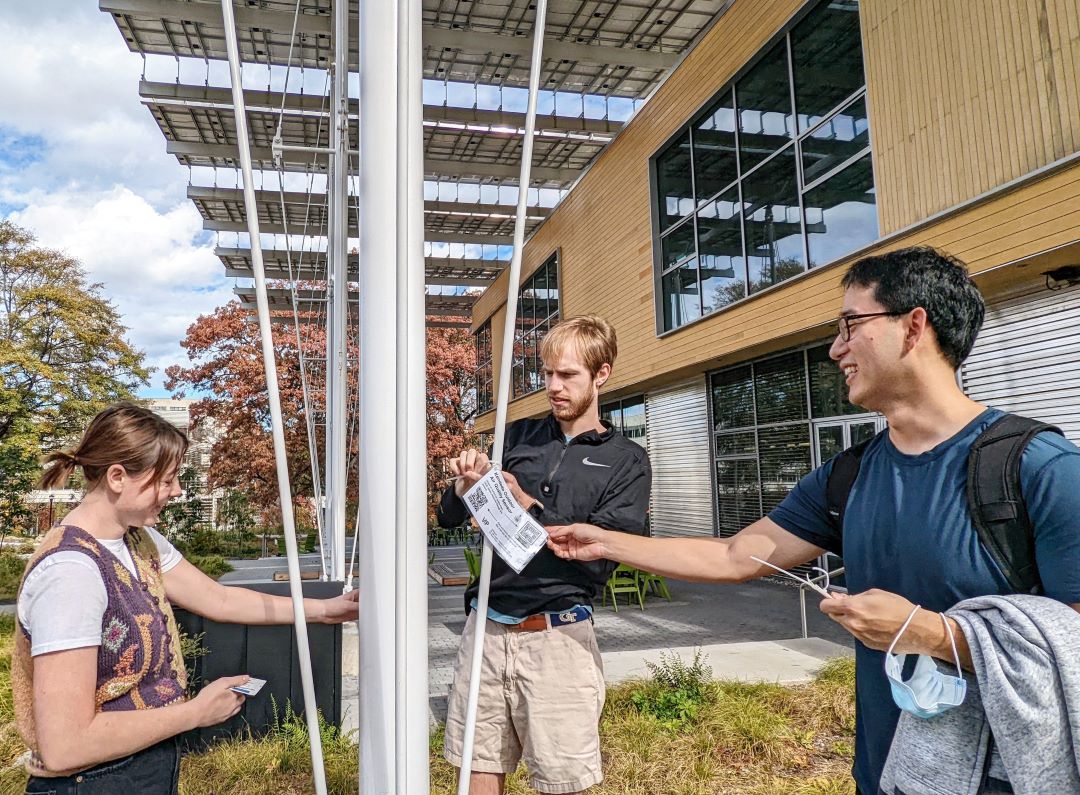Overview
Nobel Laureate Muhammed Yunus and the Grameen Bank, who transformed communities and lives through microcredit small loans that do not require collateral, inspired the Kendeda Building Advisory Board to conceive of a micro research grant program in 2021.
Eligible participants receive micro research grants ($50 to $500) to conduct limited, but novel, research experiments, design exercises, crafting of models or prototypes, or development and analysis of datasets. Research relevant to the topic of regenerative built environments is required. If you are thinking, “what is a regenerative built environment?”, then we recommend a review of www.livingbuilding.gatech.edu.
The research must incorporate the campus itself or its operations. We encourage submittals that explore ways in which our campus can continue to innovate, demonstrate, prove, and promote the adoption of best and next practices in regenerative design and operations. In your proposal, define “regenerative” design and/or operations as it pertains to your proposed project. We encourage you to relate the project to one or more of the United Nations Sustainable Development Goals (SDGs, https://sdgs.un.org/goals). Proposals are especially sought from staff and students at Georgia Tech that have not traditionally been directly involved in research, though proposals from all members of the Georgia Tech community are welcome.
Eligibility: Georgia Tech enrolled students and current faculty and staff. Note: you do not need to be a professional researcher! You do need an interesting question and a plan to figure out how to answer it.
Program Contacts: Michael Chang (BBISS, chang@gatech.edu) and Shan Arora (Kendeda Building, shan.arora@gatech.edu)


Examples of Projects Suitable for Micro Funding
This program awards limited funding ($50 to $500) over a short period of time (a few months) to investigators testing new solutions to old problems, or conceiving or prototyping new products or processes that increase regenerative design or operations. All proposed projects will be reviewed to ensure that they comport with Georgia Tech’s values (available here), and to confirm that the project is focused on the relevant research criteria. Projects that advocate or assail positions, policies, or persons, or do not have research as the central theme will be rejected. Due to micro-grant size and short time scales, all proposed projects must avoid any activity that requires Institutional Review Board approval (i.e., no research involving human or animal subjects, living tissues, radioactive materials, etc.). The following examples of past Micro Research Grant projects are illustrative of the type and scale of micro-grant research projects that could be proposed: https://research.gatech.edu/sustainability/micro-grants
How to Submit a Proposal
A proposal of no more than 2-pages should be written and include:
- Title of project;
- Description of the project (the issue or problem to be addressed and the expected outcome of the research);
- Outline of the methodology (experimental procedure, source of data, facilities to be used for prototyping, etc.);
- Description of the deliverable (report, charts, model, database, video, widget, etc.);
- Amount requested for research and what the funds will be used for; and
- Full contact information for the Principal Investigator and names and roles of other team members.
Submit an application and 2-page proposal by November 6, 2023 at: https://forms.office.com/r/tFjMMx3J2K.
Review and Award
The program contacts will review all proposals and select several by November 30, 2023 for funding. Upon receipt of the award, investigators will be asked to complete their research and submit deliverables by Spring 2024 at a Micro Research Grants Symposium (date TBD). The investigators will present their findings at this Symposium.
Expected Benefits
The Micro Research Grants for Regenerative Built Environments program is a novel, low-cost, low-risk, high-value, high-profile, and highly-inclusive means for advancing research at Georgia Tech. First, the program eliminates barriers that prevent most people from participating in university research (e.g., requirements for expensive and specialized education, credentials, knowledge, training, experience, connections, laboratories, and equipment, all supported by an extensive bureaucracy of finance, administration, publication, and regulation). It is a way to seed, introduce, and expand scientific thinking and understanding of research processes in the lay population and especially for underrepresented investigators in STEM, whose lack of experience and opportunity results in their inability to compete effectively for larger research grants. It will be a means to teach about and make transparent how science and scientists work from drafting proposals that are peer reviewed, to conducting experiments and analyzing data, to communicating and defending results. By including more people and helping them learn (by doing) how research is conducted, it will help (re)build trust in science and scientists; discover and transfer new knowledge and technology from academia to society; introduce culturally novel perspectives on problems and their solutions; create new pathways for interdisciplinary collaboration among lay and professional researchers that now are separated by large socio-economic-educational-cultural divides; and grow the total research and entrepreneurial environment that surrounds Georgia Tech.
Un-Expected Benefits
Who knows… you may be the next Muhammed Yunus. A revolutionary idea can start with a micro-grant.